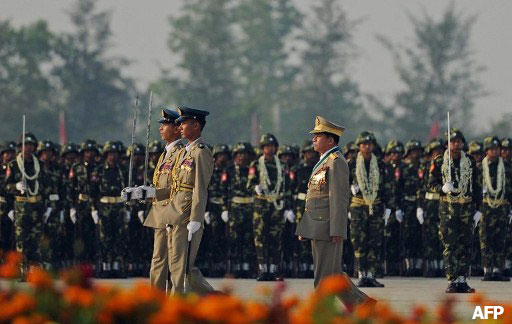The U.S. dangled the carrot of direct military ties with Burma during the regional military conference in Singapore that ended over the weekend.
 If the country continues to enact political and human rights reforms, U.S. pentagon chief Leon Panetta told Asian leaders “the Pentagon would be willing to have discussions about how the countries can improve their military relationship,” Panetta said.
If the country continues to enact political and human rights reforms, U.S. pentagon chief Leon Panetta told Asian leaders “the Pentagon would be willing to have discussions about how the countries can improve their military relationship,” Panetta said.
“In dealing with the countries of the Asia-Pacific region, this is not a Cold War situation where the U.S. simply charges in, builds permanent bases and tries to establish a power base in this region,” Panetta said, responding to a question after his speech at the Shangri-La Dialogue, a regional defense conference.
In February, Mizzima reported that Burma had expressed interests in taking part in Gold Cobra 2012, the US-led annual multinational military exercise, the largest such military endeavor in the Asia-Pacific.
A senior Thai army officer was quoted by Japan's Kyodo News saying that Burma had expressed an interest in joining the annual exercises in the future. Participating nations include Thailand, the U.S., Singapore, Japan, South Korea, Indonesia and Malaysia.
Panetta said the U.S. seeks to engage with other countries to help them build their own military capabilities so they can defend themselves effectively.
“We will encourage that kind of relationship with every nation that we deal with in this region, including Myanmar,” Panetta said.
A senior defense official said Panetta’s remarks rested on Burma continuing on the path of democratic reform and the promotion of human rights, and if it shows progress stronger military ties would be possible.
Last month, President Barack Obama eased an investment ban on Myanmar and named the first U.S ambassador to the country in 22 years, Derek Mitchell, who is in the process of being confirmed by Congress. His confirmation is expected sometime later this summer.
Panetta's speech at the conference was designed to promote America's new effort to focus more attention on the Asia-Pacific region, both militarily and diplomatically, observers said. The U.S. has been quick to say that a more vigorous presence in the Asia-Pacific area does not pose a threat to China, and it strengthens both nations’ interest in peace in the region.


